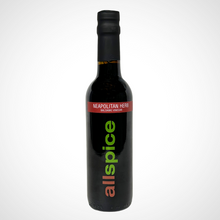Good Eats:marinades for steak or poultry, a dash of spice in a Bloody Mary at brunch, dressings for salads and fresh vegetables, pastas, or grains, and partnered with creamy cheeses like chèvre.
Perfect Pairs:single-varietal olive oils, or with Garlic Olive Oil.
Ingredients: Cooked grape must, wine vinegar, natural flavors, naturally occurring sulfites
As a kid growing up in the late 20th Century, Neapolitan was a thing your mom bought to go with your birthday cake: a rectangular carton with three kinds of ice cream inside. Vertical strips of pink strawberry, white vanilla, and brown chocolate ice cream, so everyone at your birthday party could have their favorite flavor with their slice of cake.
Now that we are (at least technically speaking) grown-ups, we've learned that Neapolitan is a word that describes things that come from Naples, Italy, which just happens to be a place with a rich culinary history. Neapolitan cooking is a complex sophisticated-meets-peasant cuisine with influences of Arab, Norman, Spanish and French cultures, all of whom ruled Naples at some point in the past 2000+ years.
Heralded as a great example of the healthy "Mediterranean Diet," Neapolitan cuisine is heavy on tomatoes, beans, seafood, veggies and cheese -- spiced with lots of garlic and fresh herbs. Our Neapolitan Herb Balsamic vinegar has that same complex taste that evokes the cuisine of Naples: traditional herbs including rosemary, marjoram, thyme, garlic, and sage.
A dark balsamic vinegar, Neapolitan Herb Balsamic is an excellent choice for dishes that need a zesty, savory touch, like marinades for steak or poultry, a dash of spice in a Bloody Mary at brunch, dressings for salads and fresh vegetables, pastas, or grains, and partnered with creamy cheeses like chèvre. Pair Neapolitan Herb Balsamic with one of our single-varietal olive oils, or with Garlic Olive Oil.
Balsamic Vinegar is a delicious aged vinegar, prized for its sweet-tart, concentrated flavor. We offer you the very best Balsamic Vinegars that we import directly from the rolling hills of Modena, Italy, where true balsamic vinegars have been produced since the Middle Ages.
True balsamic vinegar is not made from wine, as you might expect, but rather from pressed, un-fermented Trebbiano and Lambrusco grapes. The pressed grapes are simmered over an open flame, and reduced to a thick syrup. This sweet syrup is in turn fermented twice, then slowly aged and evaporated in a succession of smaller and smaller barrels, made from different aromatic woods. As the balsamic vinegar ages, moisture evaporates out, and the vinegar thickens and its complex flavors become more concentrated.
Balsamic Vinegar has many culinary uses, including salad dressings, dips, marinades, reductions and sauces. Try a splash of balsamic vinegar to enhance steaks, fish, egg dishes -- even fresh fruit, and on ice creams, gelati and desserts. Buon Appetito!




